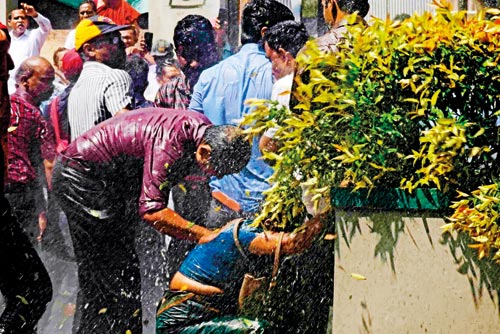News
Teachers and principals dig in their heels on overdue pay

Teachers protesting in Colombo. Pic by Akila Jayawardena
Teachers and principals have voiced their discontent over a delay in paying their arrears stemming from salary anomalies.
The teachers and principals who came out to protest over the issue were tear-gassed, and now they have been holding protests at the provincial level against the police action. Indications are that protests will continue.
In 2021, 24 years after the crisis emerged in 1997, the government paid one-third of the arrears to a teacher who received Rs. 30,000 in minimum wage and got the anomaly rectified with Rs. 11,000.
“We urge the government to pay attention to the remaining two-thirds, which has posed challenges to the profession,’’ Ceylon Teachers Service Union (CTSU) General Secretary Mahinda Jayasinghe told the Sunday Times.
He said Rs. 30 billion was set aside to clear one-third of the arrears in 2021, while according to their estimates, another Rs. 42 billion would be needed to clear the remaining two-thirds.
He said that for 2024, Rs. 239 billion has been allocated for education according to the appropriations bill.
Mr. Jayasinghe said the salary anomalies add more difficulty when recruiting new teachers and keep those who are already in the field with inadequate wages.
Regarding retention, it has been observed that teachers who put in the most effort and beat expectations are more likely to get discouraged when their commitment is not appreciated, leading to many eventually being compelled to pursue another career, he warned.
It has been demonstrated that increasing wages would further make the profession more appealing. Following that, teaching would gain social status, boosting teacher motivation.
Rs. 239 billion has been allocated for education, and there is an urgent need to increase the budget allocation for education to pay the arrears and meet the costs arising from issues such as improper distribution of textbooks and the rising cost of stationery and essential school supplies. These issues have left the educational sphere on the brink of collapse, he noted.
Principals’ Union President Mohan Parakrama Weerasinghe said the current compensation grades and salary ranges that control pay expenses do not ensure pay equity among principals of the three grades.
Only about one-third of the total monthly wage has been paid to principals, and the government has failed to allocate funds for increments, and often pay cuts are part of that.
Although functions vary by locality, besides setting academic goals and curriculum development, principals also engage in the management of physical, financial, and human resources. All this is fulfilled while being in the midst of a complete breakdown of the salary, including allowances, namely mobile and cost-of-living allowances, etc., Mr. Weerasinghe said.
In August 2021, an inter-ministerial sub-committee reached a decision to offer a quick fix to the 11 matters raised, but two years have elapsed without a resolution. This mirrors the inefficiency of the education administration of the Ministry of Education, he said.
Meanwhile, Joseph Stalin, general secretary of the Ceylon Teachers’ Union, said teachers remain the most underpaid in the country. Promotions have come to a halt.
He said the unions await a positive outcome after the November 13 budget day.
Unions under pressure warned that measures would be taken to launch a large-scale protest campaign with public support if the government failed to heed their concerns.
A senior official from the Ministry of Education (MoE) emphasised: “Steps to make sure teachers and principals feel more supported and valued for their hard work will be brought into effect in due time in response to teacher-principal unions’ grievances about low pay and their accusations that it was one ground for the nations’ declining educational standards.”
“Policy decisions concerning teacher and principal compensation have already been adopted by the MoE, and a final resolution will come to the fore considering the constitutional aspects of the national budget regarding reemerging new reforms,” he said.
Finance State Minister Ranjith Siyambalapitiya, drew attention to how Sri Lanka’s education sector is principally financed through domestic resources and funding for school development is carried out via the provincial council level.
The best way to say that you found the home of your dreams is by finding it on Hitad.lk. We have listings for apartments for sale or rent in Sri Lanka, no matter what locale you're looking for! Whether you live in Colombo, Galle, Kandy, Matara, Jaffna and more - we've got them all!

